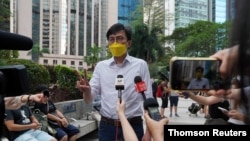Hong Kong pro-democracy activist Avery Ng is readjusting to freedom following his April release from prison, where he served a 12-month sentence for unauthorized assembly under the city’s mini-constitution, the Basic Law.
Ng and nine other activists were sentenced in May of last year for taking part in unapproved pro-democracy protests in October 2019. His sentencing coincided with the 70th anniversary of the Chinese central government.
Ng notes how the political landscape has changed since 2019, when protesters called for the Hong Kong government to do away with a controversial bill that would have allowed suspects to be extradited to mainland China for trial.
That protest eventually led to more demands for freedom as demonstrators and police clashed in universities, metro stations and the skyscraper-lined streets in the city.
To prevent the demonstrations from happening again, Beijing enacted a national security law for Hong Kong, providing a maximum sentence of life imprisonment for acts deemed as secession, subversion, terrorism and foreign collusion. Today at least 150 dissidents have been arrested and a smaller number jailed under the law.
Ng hasn’t been targeted under the legislation, and compared to other activists, he is in a unique position.
“I am one of the few, the remaining handful, who is not in jail and not in technical exile," he said.
Since his release, the 45-year-old former head of the activist group League of Social Democrats has noticed the effect the crackdown has had on Hong Kong’s independent media.
“During my time in prison, it was when they closed down Apple Daily and Stand News. The first thing I noticed, as soon as I got out, was there was no news,” Ng said.
Media shutdowns
Pro-democracy newspaper Apple Daily was forced to close in June 2021 after founder Jimmy Lai and several of the outlet’s executives were charged under the security law.
Other media outlets followed, including news site Stand News, which decided to close in December after police officers raided its newsrooms as part of a sedition investigation.
“We don’t have that many sources of news, and even if there is news, people are too afraid to like or to share [on social media],” Ng said. “Hong Kong on the surface is the same, but on the day-to-day basis, that self-censorship, there’s a constant layer of fear covering all of us.”
Hong Kong has since fallen from 80th place to 148th in the World Press Freedom Index, ranked by media watchdog Reporters Without Borders (RSF).
Prior to the unrest in 2019, Ng spent one month in prison for disclosing the identity of a government official who was under investigation for corruption.
Today Ng and his colleagues are still under the watchful eye of the Hong Kong authorities.
On July 1 of this year, the 25th anniversary of Britain’s handover of Hong to China, Ng and his group did not demonstrate. He did not go into detail.
“Around those days, Hong Kong becomes sensitive,” Ng said, referring to a visit by Chinese President Xi Jinping for the anniversary. “We understood we couldn’t do any more campaigning, any more street stands."
Over the past two years, citing the pandemic, Hong Kong authorities banned group gatherings in the city and as a precaution deployed thousands of police officers to prevent any major demonstrations on the date.
Ng and his League of Social Democrats “were pressured to the point where we could not do any protest,” he added, referring to Chan Po-ying, chairwoman of the group, who also made a statement in June about the decision.
In the past, the date was prominent on the Hong Kong political calendar, often met with protests demanding democracy and universal suffrage.
Despite the setback, the League of Social Democrats is still trying to continue with its mission. Founded in 2006, the group positions itself as a radical wing of the pro-democracy camp.
While dozens of civil society and activist groups have closed operations, Ng’s group remains one of the last functioning activist organizations in Hong Kong.
Ng acknowledged the group could eventually succumb like the others.
“In terms of the party’s existence, there is a big question mark. People are afraid to donate — not that they don’t support — and we are not allowed to do any street stands because we’ve been arrested by authorities and charged for illegal fund raising," he said, adding that he remains optimistic the group can keep speaking out for the voiceless.
“As long as we have our mouth, and we still have our pain, we can still do something. The social inequality, the deterioration of the education system, there are so many social issues in Hong Kong that someone needs to at least voice out.”
And even though speaking out carries considerable risks, Ng said he isn’t compelled to leave Hong Kong, like pro-democracy activist Nathan Law and former democratic lawmaker Ted Hui, both of whom remain in self-exile abroad.
“I don’t want to [leave],” he told VOA. “Hong Kong is my home and I do not want to leave home. And when you see your house is on fire, you try to stay as long as possible. I’m a cautious optimistic; yes, we are in a gray dark time, but I still have hope.”







